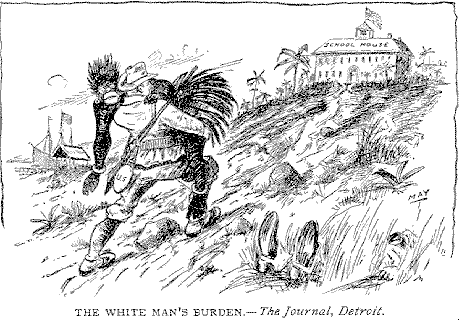The History Guy: Historical Poems
"The White Man's Burden"
by Rudyard Kipling
-------------------------------------------
Take up the White Man's burden, Send forth the
best ye breed
Go bind your sons to exile, to serve your captives'
need;
To wait in heavy harness, On fluttered folk and wild—
Your new-caught, sullen peoples, Half-devil and
half-child.
Take up the White Man's burden, In patience to abide,
To veil the threat of terror And check the show of
pride;
By open speech and simple, An hundred times made plain
To seek another's profit, And work another's gain.
Take up the White Man's burden, The savage wars of peace—
Fill full the mouth of Famine And bid the sickness
cease;
And when your goal is nearest The end for others sought,
Watch sloth and heathen Folly Bring all your hopes to nought.
Take up the White Man's burden, No tawdry rule of kings,
But toil of serf and sweeper, The tale of common
things.
The ports ye shall not enter, The roads ye shall not tread,
Go mark them with your living, And mark them with
your dead.
Take up the White Man's burden And reap his old reward:
The blame of those ye better, The hate of those ye guard—
The cry of hosts ye humour (Ah, slowly!)
toward the light:—
"Why brought he us from bondage, Our loved Egyptian
night?"
Take up the White Man's burden, Ye dare not stoop to less—
Nor call too loud on Freedom To cloke your weariness;
By all ye cry or whisper, By all ye leave or do,
The silent, sullen peoples Shall weigh your gods and
you.
Take up the White Man's burden, Have done with childish days—
The lightly proferred laurel,
The easy, ungrudged praise.
Comes now, to search your manhood, through all the thankless
years
Cold, edged with dear-bought wisdom, The judgment of your
peers!

White Man's Burden Political Cartoon (with Racist Imagery)
Rudyard Kipling, perhaps best known as the writer of Jungle Book, was an English poet whose poems spoke to the British colonial experience, and was a writer whose words eloquently captured the life and mores of British soldiers, particularly those who served in India.
The poem later known as The White Man's Burden, was originally composed for Queen Victoria's Diamond Jubilee, but Kipling used a poem called Recessional for that event instead of White Man's Burden.
The version of this poem that was eventually published= in American newspapers on February 5, 1899, and was intended to speak to an American public that was still digesting the idea that America was now a colonial power, not dissimilar to America's old foe, Britain. Having recently won the Spanish-American War, the U.S. was now in possession of the Philippine Islands, and was about to embark on a bloody four-year struggle to suppress that nation's desire for independence.
Many Americans who supported the idea of an American Empire, found this Kipling poem a justification of the rightness of a white nation suppressing a non-white nation. Others saw this poem, especially in the light of his other work, Recessional, as being critical in a satirical manner, of the whole concept of taking on another's burden for imperial gain.